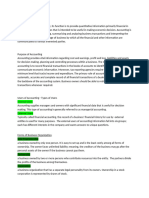The Fascinating World of Finance
The Fascinating World of Finance
Uploaded by
Hendrik_216Copyright:
Available Formats
The Fascinating World of Finance
The Fascinating World of Finance
Uploaded by
Hendrik_216Original Description:
Copyright
Available Formats
Share this document
Did you find this document useful?
Is this content inappropriate?
Copyright:
Available Formats
The Fascinating World of Finance
The Fascinating World of Finance
Uploaded by
Hendrik_216Copyright:
Available Formats
Title: The Fascinating World of Finance
Introduction: Finance, the art and science of managing money, investments, and financial resources,
plays a pivotal role in the functioning of economies and the lives of individuals. It encompasses a
wide range of activities, from budgeting and personal finance to corporate finance and global
markets. This essay aims to explore the captivating world of finance, shedding light on its
importance, key concepts, and its impact on individuals and society as a whole.
Body:
I. The Significance of Finance:
Efficient Allocation of Resources: Finance serves as a mechanism for efficiently allocating scarce
resources in an economy. It enables individuals, businesses, and governments to make informed
decisions about the allocation of funds, ensuring optimal utilization and maximizing returns. Through
financial analysis and planning, resources can be channeled towards productive ventures, fostering
economic growth.
Risk Management and Mitigation: Finance provides tools and strategies for managing and mitigating
risks. From individual investors seeking to diversify their portfolios to corporations hedging against
market fluctuations, risk management is a crucial aspect of financial decision-making. Techniques
such as insurance, derivatives, and portfolio diversification help mitigate risks and protect against
unforeseen events.
II. Key Concepts in Finance:
Time Value of Money: The concept of time value of money recognizes that the value of money
changes over time due to factors such as inflation and the opportunity cost of capital. Understanding
this principle enables individuals and businesses to evaluate the profitability of investments,
calculate present and future values, and make informed financial decisions.
Financial Markets and Instruments: Financial markets serve as platforms where individuals,
corporations, and governments trade financial assets such as stocks, bonds, and derivatives. These
markets facilitate the flow of capital and provide opportunities for investment and financing.
Financial instruments such as stocks, bonds, and options allow investors to participate in the
markets and manage their financial portfolios.
Capital Budgeting and Investment Decisions: Capital budgeting involves evaluating and selecting
investment projects that generate long-term value. Techniques such as net present value (NPV),
internal rate of return (IRR), and payback period help assess the feasibility and profitability of
investment opportunities, aiding decision-makers in allocating resources efficiently.
III. Finance and Individuals:
Personal Financial Planning: Finance plays a crucial role in personal financial planning, helping
individuals manage their income, expenses, savings, and investments. Concepts such as budgeting,
retirement planning, and risk management enable individuals to achieve their financial goals, secure
their future, and navigate financial challenges effectively.
Credit and Debt Management: Understanding finance is essential for managing credit and debt.
Financial literacy empowers individuals to make informed decisions regarding borrowing, managing
credit cards, mortgages, and loans, ensuring responsible and sustainable financial practices.
IV. Finance and Society:
Corporate Finance and Economic Growth: Sound financial management is vital for businesses to
thrive and contribute to economic growth. Effective corporate finance strategies, including capital
structure, financing decisions, and dividend policies, enhance firms' profitability and
competitiveness, stimulating economic development and job creation.
Financial Institutions and Stability: Financial institutions, such as banks and insurance companies,
play a critical role in facilitating economic activities and providing essential financial services. They
channel savings into investments, manage risks, and provide liquidity, contributing to the stability
and growth of the financial system and the broader economy.
Conclusion: Finance serves as the backbone of economic systems and an indispensable tool for
individuals, businesses, and governments. Its significance lies in its ability to allocate resources
efficiently, manage risks, and drive economic growth. Whether in personal financial planning or
corporate finance decisions, understanding key concepts and principles of finance empowers
individuals to make informed choices and navigate the complexities of the financial world. By
embracing the fascinating world of finance, we can harness its potential to create a prosperous and
sustainable future for individuals and society
You might also like
- Corporate Finance Foundations Global Edition 15th Edition Block Test Bank 1Document72 pagesCorporate Finance Foundations Global Edition 15th Edition Block Test Bank 1tiffany100% (55)
- Accounting For Non-AccountantsDocument4 pagesAccounting For Non-AccountantsAnonymous ilWXWxgNo ratings yet
- IFRS Short Requiremnts Diagram PDFDocument62 pagesIFRS Short Requiremnts Diagram PDFTamirat Eshetu WoldeNo ratings yet
- Chapter 4 AnswersDocument4 pagesChapter 4 Answerscialee100% (2)
- FinanceDocument1 pageFinancekhuzaimarazzaq246No ratings yet
- 1.5 Advanced Financial Management Objective:: Page 1 of 1Document95 pages1.5 Advanced Financial Management Objective:: Page 1 of 1Sandeep As SandeepNo ratings yet
- Bba FM Sem 2 Mod 1Document12 pagesBba FM Sem 2 Mod 1LEKSHMI CHANDRANo ratings yet
- Introduction To FinanceDocument6 pagesIntroduction To FinancemiranahumasaNo ratings yet
- Introduction To FinIntroduction To FinanceanceDocument6 pagesIntroduction To FinIntroduction To FinanceanceSreyash MantryNo ratings yet
- FINANCIAL MARKETS AND INSTITUTIONS - NotesDocument32 pagesFINANCIAL MARKETS AND INSTITUTIONS - NotessreginatoNo ratings yet
- Finance Is The Discipline That Deals With The Management of Money and AssetsDocument1 pageFinance Is The Discipline That Deals With The Management of Money and AssetsKing HawawuNo ratings yet
- Wealth ManagementDocument8 pagesWealth Managementbrightsbrain56No ratings yet
- 141029Document8 pages141029vanshikakataria554No ratings yet
- Introduction To FinanceDocument3 pagesIntroduction To Financemanesour2004No ratings yet
- ECO 213 Lecture Note (Repaired)Document53 pagesECO 213 Lecture Note (Repaired)Terpase NomorNo ratings yet
- FinanceDocument4 pagesFinancedushyant.novelNo ratings yet
- Jawaban Review Question KeuanganDocument12 pagesJawaban Review Question Keuanganzaludin sultraNo ratings yet
- Mba 520F Finance & Money MarketDocument46 pagesMba 520F Finance & Money Marketashi.agrawalNo ratings yet
- About The SubjectDocument9 pagesAbout The SubjectSåif RøçKêrNo ratings yet
- Navigating The Dynamics of Finance - A Brief OverviewDocument1 pageNavigating The Dynamics of Finance - A Brief Overviewsyedmoeen2001No ratings yet
- 5.IMPORTANCE COMPONENTS Lecture 5Document31 pages5.IMPORTANCE COMPONENTS Lecture 5Alex William JohnNo ratings yet
- Personal Financial PlanningDocument21 pagesPersonal Financial PlanningAparna PavaniNo ratings yet
- Tactical Objective: Strategic Maneuvers, Decoding the Art of Military PrecisionFrom EverandTactical Objective: Strategic Maneuvers, Decoding the Art of Military PrecisionNo ratings yet
- Studu On Financial LiteracyDocument76 pagesStudu On Financial LiteracyFYBAF A-1007 BHANDARI AMANNo ratings yet
- 2 Financial Environment 22231_94fb67a58f85dcc7aaad315d33330659Document5 pages2 Financial Environment 22231_94fb67a58f85dcc7aaad315d33330659sophiesandragarciaNo ratings yet
- FinanceDocument28 pagesFinanceJustin LargadoNo ratings yet
- Electives DetailsDocument2 pagesElectives Detailsadishourie.909No ratings yet
- Chapter 5 - Overview of The Financial SystemDocument12 pagesChapter 5 - Overview of The Financial SystemMerge MergeNo ratings yet
- Finance EssayDocument2 pagesFinance EssayLord InsanenoNo ratings yet
- Uma Industry Assets and Liabilities MGTDocument80 pagesUma Industry Assets and Liabilities MGTKirthi KshatriyasNo ratings yet
- A083 Chapter 9 Group 1Document35 pagesA083 Chapter 9 Group 1MENESES, Trixie Ann TrapaNo ratings yet
- Financial Literacy BCA 2 YEARDocument20 pagesFinancial Literacy BCA 2 YEARtechnicalgamertg697No ratings yet
- Financial Management 2Document5 pagesFinancial Management 2kenneth bacuetesNo ratings yet
- Finance Chapter 1 PresentationDocument51 pagesFinance Chapter 1 PresentationJemila OrnelasNo ratings yet
- A083 Chapter 9 Group 1Document8 pagesA083 Chapter 9 Group 1MENESES, Trixie Ann TrapaNo ratings yet
- Full Notes (168) AFM-1 PDFDocument95 pagesFull Notes (168) AFM-1 PDFmanjula7nagarajNo ratings yet
- Management of Financial InstitutionsDocument34 pagesManagement of Financial InstitutionsLilian MuthoniNo ratings yet
- Project For HulDocument11 pagesProject For Huljsjd9039No ratings yet
- Hindusthan UnileverDocument12 pagesHindusthan Unileverjsjd9039No ratings yet
- Banking and FinancialDocument8 pagesBanking and FinancialCHARAN LALAMNo ratings yet
- Maths ProjectDocument6 pagesMaths ProjectAbhinav AgarwalNo ratings yet
- Chapter 1-Introduction To FinanceDocument34 pagesChapter 1-Introduction To FinanceRocel NavajaNo ratings yet
- Management of MoneyDocument2 pagesManagement of MoneyhapiankhatonNo ratings yet
- What Is FinanceDocument2 pagesWhat Is FinanceBon JoviNo ratings yet
- BBM 415 Updated Notes - Jan - 2024Document77 pagesBBM 415 Updated Notes - Jan - 2024sevwira gonzagaNo ratings yet
- Topic 1Document9 pagesTopic 1thabiti mohamediNo ratings yet
- Financial Intitutions and MarketsDocument92 pagesFinancial Intitutions and MarketsBalaji KannanNo ratings yet
- Lecture NotesDocument3 pagesLecture NotesAmrit KaurNo ratings yet
- What Is FinanceDocument8 pagesWhat Is FinanceGULBAZ MAHMOODNo ratings yet
- Chapter One FM IDocument19 pagesChapter One FM Imelkamuaemiro1No ratings yet
- FinanceDocument11 pagesFinanceshivanipandey2224No ratings yet
- FinanceDocument6 pagesFinanceIssac KNo ratings yet
- 04_chapter 1Document12 pages04_chapter 1Kunal SinghNo ratings yet
- Management of Personal Finances and Investment DecDocument11 pagesManagement of Personal Finances and Investment Decsiyojo8507No ratings yet
- Find Your Dream Finance Job: Explore The Best Opportunities On Our Finance Jobs PortalDocument11 pagesFind Your Dream Finance Job: Explore The Best Opportunities On Our Finance Jobs PortalMaryNo ratings yet
- All Document Reader 1707653100718Document19 pagesAll Document Reader 1707653100718uwitoneshaangelique22112No ratings yet
- Syndicate Bank ProjectDocument86 pagesSyndicate Bank Projectmohammed saleem50% (4)
- Business and Finance Lesson 3Document7 pagesBusiness and Finance Lesson 3BlackjackNo ratings yet
- A Study On Financial Literacy Among Students of Thane SuburbsDocument51 pagesA Study On Financial Literacy Among Students of Thane Suburbskolekardhruva99No ratings yet
- Format - SIP Progress Report SamikshaDocument10 pagesFormat - SIP Progress Report Samikshavinuta wagheNo ratings yet
- 1st Term Financial ManagementDocument76 pages1st Term Financial ManagementMallet S. GacadNo ratings yet
- Financial Management - DefinitionDocument13 pagesFinancial Management - DefinitionAmol AgarwalNo ratings yet
- Unit I - Overview of Finance and Financial Management: Notes 1 For Afm 101Document5 pagesUnit I - Overview of Finance and Financial Management: Notes 1 For Afm 101MHIL RAFAEL DAUGDAUGNo ratings yet
- Financial Shifts: Dive Into The Chaos, Seize The Power, And Unleash Your Wealth Revolution!From EverandFinancial Shifts: Dive Into The Chaos, Seize The Power, And Unleash Your Wealth Revolution!No ratings yet
- The Role of Technology in Shaping The FutureDocument2 pagesThe Role of Technology in Shaping The FutureHendrik_216No ratings yet
- 1 The Role of Technology in Shaping The FutureDocument2 pages1 The Role of Technology in Shaping The FutureHendrik_216100% (1)
- The Impact of Climate Change On Global SustainabilityDocument2 pagesThe Impact of Climate Change On Global SustainabilityHendrik_216No ratings yet
- The Ethical Dilemma of Artificial Intelligence Balancing Innovation and ResponsibilityDocument2 pagesThe Ethical Dilemma of Artificial Intelligence Balancing Innovation and ResponsibilityHendrik_216No ratings yet
- The Power of Human Connection - Building Bridges in A Divided WorldDocument2 pagesThe Power of Human Connection - Building Bridges in A Divided WorldHendrik_216No ratings yet
- Quizlet - SOM 122 Chapter 17 - Managing Business FinancesDocument3 pagesQuizlet - SOM 122 Chapter 17 - Managing Business FinancesBob KaneNo ratings yet
- PARCORDocument14 pagesPARCORChristine DaelNo ratings yet
- Modern Approaches To Portfolio ConstructionDocument8 pagesModern Approaches To Portfolio Constructionjoeljose2019jjNo ratings yet
- Quiz Bee QestionnairesDocument34 pagesQuiz Bee Qestionnairesanor.aquino.upNo ratings yet
- Far 3 PDF FreeDocument6 pagesFar 3 PDF Freejunica casi�oNo ratings yet
- Lesson 4 - LIQUIDATION BASED VALUATION - Unit 1 - Liquidation Value - Fb2ca0cd5f0a68Document2 pagesLesson 4 - LIQUIDATION BASED VALUATION - Unit 1 - Liquidation Value - Fb2ca0cd5f0a68Jessica PaludipanNo ratings yet
- KPMG IFRS Illustrative Financial Statements 2023-1Document239 pagesKPMG IFRS Illustrative Financial Statements 2023-1FERDI EDEN BARRIOS LUXNo ratings yet
- Entrepreneurial Accounting and Financial ManagementDocument13 pagesEntrepreneurial Accounting and Financial ManagementNikko Rey Amoguis MainitNo ratings yet
- حل واجب BE210/4 >>> 00966597837185 واجبات الجامعة العربية المفتوحةDocument16 pagesحل واجب BE210/4 >>> 00966597837185 واجبات الجامعة العربية المفتوحةحلول واجبات الجامعة الجامعة العربية المفتوحةNo ratings yet
- Tech Mahindra: Financial Analysis To Determine Investment Decision by Group C10Document9 pagesTech Mahindra: Financial Analysis To Determine Investment Decision by Group C10Sucharita SahaNo ratings yet
- Seminar Set IV - Portfolio ManagementDocument2 pagesSeminar Set IV - Portfolio Managementbukomohamed124No ratings yet
- FM Introduction & Decision-MakingDocument22 pagesFM Introduction & Decision-MakingRobel GuiseppeNo ratings yet
- ABC Company, Inc. Recapitalization AnalysisDocument10 pagesABC Company, Inc. Recapitalization AnalysisMarcNo ratings yet
- (123doc) Question Financial Statement AnalysisDocument9 pages(123doc) Question Financial Statement AnalysisUyển's MyNo ratings yet
- ABMF 3174 AssignmentDocument39 pagesABMF 3174 AssignmentRayNo ratings yet
- DoMS Investment Banking Capital Market OperationsDocument2 pagesDoMS Investment Banking Capital Market OperationsKumarNo ratings yet
- Book Keeping and Accountancy March 2020 STD 12th Commerce HSC Maharashtra Board Question PaperDocument5 pagesBook Keeping and Accountancy March 2020 STD 12th Commerce HSC Maharashtra Board Question PaperShubham ParmarNo ratings yet
- HLB Receipt-2023-03-08Document2 pagesHLB Receipt-2023-03-08zu hairyNo ratings yet
- True False True: Stockholders' EquityDocument3 pagesTrue False True: Stockholders' EquityOMAYOMAYNo ratings yet
- Long Iron Butterfly Spread - FidelityDocument8 pagesLong Iron Butterfly Spread - FidelityanalystbankNo ratings yet
- Fundamentals of Accounting Notes - WPS OfficeDocument6 pagesFundamentals of Accounting Notes - WPS OfficejoshpelitonesNo ratings yet
- Part 1.1 Internal Control Over CashDocument2 pagesPart 1.1 Internal Control Over CashGaza Jemi GadeNo ratings yet
- Comprehensive Exam: Attempt HistoryDocument44 pagesComprehensive Exam: Attempt HistoryJoel Kennedy BalanayNo ratings yet
- Edinburgh Napier University Postgraduate ProspectusDocument208 pagesEdinburgh Napier University Postgraduate ProspectusDanielNo ratings yet
- Acc 221-Ias 1 - 032313Document15 pagesAcc 221-Ias 1 - 032313Rahman OmaryNo ratings yet
- Financial Management FN6213 Assignment 2 Cost of Capital (WACC)Document4 pagesFinancial Management FN6213 Assignment 2 Cost of Capital (WACC)Anutaj NagpalNo ratings yet






























































































